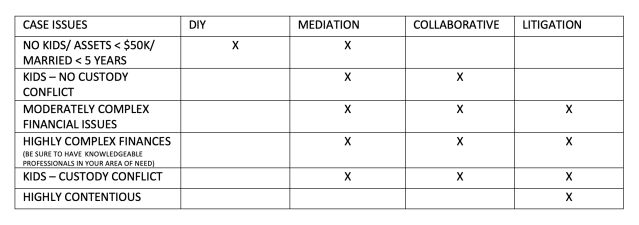Depression
Why Trying to Save Money in Your Divorce May Cost You
Using the wrong legal model can make your divorce take longer and cost more.
Posted March 19, 2023 Reviewed by Abigail Fagan
Key points
- How you begin your divorce matters. It's valuable to choose a modality for divorce proceedings rather than a person/attorney.
- Do research ahead of time so you understand all of your options.
- When possible, don't let money drive your choices.
Ending a marriage is hard. Deciding to get a divorce is harder.
Divorce is sad and often scary and overwhelming. In addition to all of the intense emotions each person feels when they realize they can't save what they may have spent years trying to build, they have to contend with a maze of legalese, court proceedings, and expensive attorneys. There are many choices to be made and, for most, no life experience to draw from to figure it all out.
Any mistake that is made in this process risks costing you dearly, so reducing the number of errors should be everyone's goal. That said, missteps will undoubtedly be made along the way. The key is to keep them low in numbers, low in impact and low in dollar amounts. Keeping this in mind, where does one start?
Do I Start By Finding An Attorney? Probably Not.
What is the first step a divorcing person should take to get the ball rolling? Ninety-five percent of people would answer this question with, "get an attorney," but, that is oftentimes one of the worst moves people can make.
Without doing any real research on the divorce process, folks will often ask their sister, neighbor, friend or co-worker for the name of the attorney they used in their divorce last year. They believe that getting an attorney on board right away will help prevent them from erring, yet, by starting their divorce in this way, they've already made a huge mistake; one that might cost them dearly indeed.
Wait. What? How can that be? Divorce is a legal process and you need to hire an attorney to represent your interests, right?
Well, yes, you do, but don't base your choice on who the attorney is. She or he may be a great person - funny, charming, smart, capable, but your attorney's personality is irrelevant if you are in the wrong process.
So, what is the best first step? In almost any divorce, the first step should be to choose the process (DIY, Mediation, Collaborative or Litigation) you will use, not the person you will hire. Not all divorce modalities are created equal and so when you choose person over process, you will be at the mercy of whatever process your attorney uses rather than the process that is right for you.
One of the best examples I witnessed of this playing out was a friend of mine who hired someone she knew from her social circles. She liked him and felt comfortable with him. What she didn't know was that this attorney was known as one of the toughest litigators in the county. When her husband saw who she hired, he naturally had to hire an attorney who could go up against this man. It ended up costing them dearly and they had no kids and only the house and some retirement accounts to split. If they had hired lawyers based on a kinder, gentler divorce process, they would have spent far less.
Let's Mediate So We Can Save Money. Maybe.
In another situation, a couple decided they would do mediation to save money. A common misconception folks have is that mediation will cost less because there's only one professional. But, if you're doing mediation properly, each party should also have their own consulting attorney, so the "one professional" notion is incorrect.
This couple started out fine but as they got into the nuts and bolts of the custody agreement and splitting the assets, they couldn't agree on anything. Their mediation went on for months and months. If they had hired litigating or collaborative attorneys, there's a good chance they would have gotten their issues resolved sooner.
Collaborating Is the Way to Go. Unless It Isn't.
One woman in my practice decided to choose the Collaborative Divorce model because she thought it would make her husband "behave," (a man she already knew was acting in bad faith because, looking back, she realized he'd been scheming to divorce her for months and pulled some irreversible shady financial stunts). The Collaborative team was not effective in getting him to step up and be more generous. They were, however, effective in getting her to roll over and accept unacceptable terms since he clearly wouldn't budge. Because she would have had to hire a new litigator with money she didn't have, she felt she had no choice but to follow through with this divorce model. She felt worse having tried Collaborative and felt duped not only by her husband, but by the professionals as well.
There are pros and cons to each paradigm. When each of these models works well, it's a great feeling, but when they fail, it's unquestionably insult on top of injury.
Do Your Due Diligence
I get it. It's really hard to know how to get through it all. That's why it's so important to do as much research as you can before you start. I highly recommend you learn about the various divorce methods prior to beginning the formal process. There are some helpful books out there.
I've created some charts that I hope will give some guidance as to which process you should choose based on your situation, finances, personality types, and special circumstances you have to contend with. Please note that this is meant to be general guidance as a starting point. This is not a substitute for legal advice.

The first chart (Chart #1) gives you a general idea of how costly each modality is. Keep in mind that a far better indicator of cost is how much conflict there is. Couples who can agree on how to divide their assets and debts, custody of the kids as well as ongoing support will spend less money than those who disagree or those who have high emotion. If one person in the couple is very angry, scared or sad, they may impede forward progress. It can sometimes be best to wait to start a divorce until emotions are calmer.
Chart #2 shows the number of lawyers that may be required for each particular model. Keep a couple of things in mind: The first is that it's not mandatory to have consulting attorneys in mediation, but it is strongly advised so that each party has someone looking out for their own needs as opposed to a neutral who won't advocate for either. How and how often each person uses them is up to them.

Also, those who choose to do litigation can represent themselves, but this is almost always a bad idea. Most people don't understand court filings and procedures and most are too invested in the outcome so getting an attorney is just a better way to go.
There's another consideration when factoring your expenses for a marital dissolution. Are there other professionals such as CDFAs, CPAs, Financial Neutrals, Actuaries, Forensic Accountants, therapists, Parenting Coordinators, or Child Specialists that you'll need to call on? Although not usually as expensive as lawyers, using other professional services can add up quite quickly, too.
Finally, Chart #3 gives a rough idea of which method is best for the issues you have in your case. As you can see, this is very broad and your case probably has several nuances not captured here. Again, this is meant to give you a broad idea of factors to consider when choosing which modality to employ.

Other considerations include how much trust you have in your spouse, whether or not you have good communication, whether you can negotiate well and in good faith, who has what knowledge of the finances, and how well you each understand the law.
Conclusion
Divorce is an extremely complex process. It's basically a big soup and there's no obvious issue to tackle first which is why this process can be confusing and costly. Understanding that the more research you can do, the better, and choosing a modality over a person when choosing an attorney can be the key to saving money and creating less heartache.
At the very least, I hope this post gives you some tools for starting out on the right foot. I wish you well.
No part of this publication may be reproduced, stored in a retrieval system, or transmitted in any form or by any means electronic, mechanical, photocopying, recording, scanning, or otherwise without the express written permission of the author.




